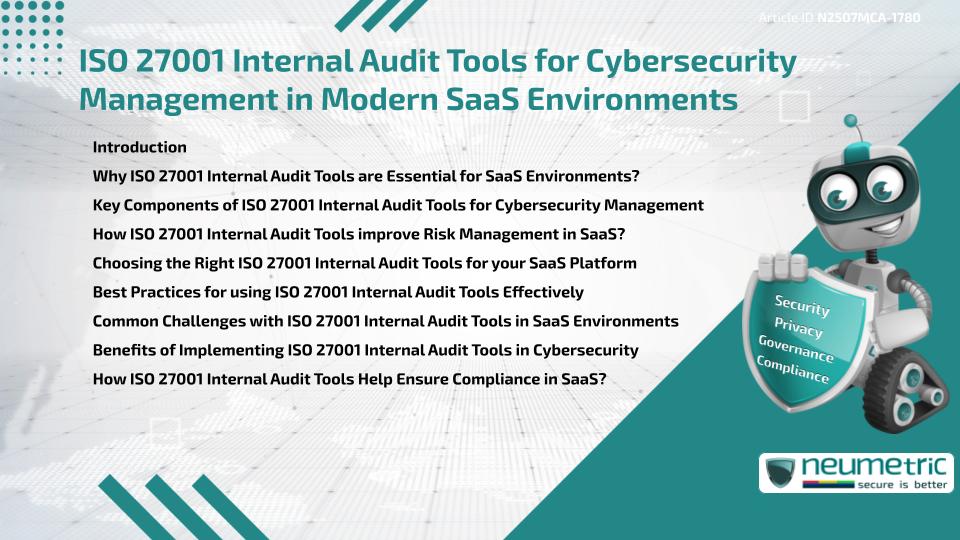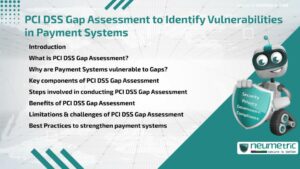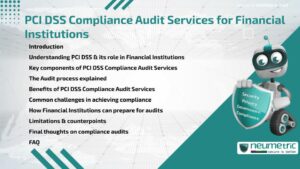Table of Contents
ToggleIntroduction
As Businesses continue to adopt Cloud-based Solutions & Software-as-a-Service [SaaS] Platforms, the need for robust Cybersecurity measures has never been greater. Protecting Sensitive Data & ensuring Compliance with Industry Standards are top priorities. One of the most effective ways to ensure these goals are met is through the use of ISO 27001 Internal Audit Tools for Cybersecurity Management. These Tools help Organisations identify Vulnerabilities, manage Risks & maintain Compliance with the Information Security Management System [ISMS] standard.
In this article, we will explore how these Audit Tools work, why they are essential for modern SaaS Environments & how they contribute to an Organisation’s Cybersecurity strategy.
Why ISO 27001 Internal Audit Tools are Essential for SaaS Environments?
SaaS Platforms host Sensitive Data & provide access to Critical Applications, making them prime targets for Cyberattacks. Therefore, SaaS Providers must follow strict Security Protocols to safeguard their Clients’ information. ISO 27001 is one of the most recognised standards for managing Information Security Risks & Internal Audit Tools are integral to maintaining its effectiveness.
ISO 27001 Internal Audit Tools for Cybersecurity Management allow SaaS Providers to assess & improve their Information Security Practices regularly. These Tools provide an automated & structured approach to monitoring Compliance, identifying weaknesses in Security Systems & ensuring that all necessary controls are in place.
Key Components of ISO 27001 Internal Audit Tools for Cybersecurity Management
ISO 27001 Internal Audit Tools are designed to assess several key aspects of Information Security Management:
- Risk Assessment: These Tools help identify potential Risks, such as Vulnerabilities in Infrastructure or Software, that could impact the Security of SaaS Platforms.
- Control Testing: Internal Audit Tools test the effectiveness of Security Controls, ensuring that measures like Encryption, Access Management & Incident Response Protocols are functioning as intended.
- Compliance Monitoring: ISO 27001 Tools ensure that SaaS Platforms comply with both Internal Policies & External Regulations such as GDPR or HIPAA.
- Incident Management: They assist in evaluating how well an Organisation responds to Cybersecurity Incidents, allowing for Continuous Improvement in the response process.
By systematically addressing these components, ISO 27001 Internal Audit Tools ensure that Organisations are always prepared for potential Cybersecurity Threats.
How ISO 27001 Internal Audit Tools improve Risk Management in SaaS?
In a SaaS Environment, managing Cybersecurity Risks is especially challenging due to the complexity of shared Infrastructures & Data access across multiple Clients. ISO 27001 Internal Audit Tools provide a Framework to continuously assess & mitigate Risks.
Through automated Audits & real-time monitoring, these Tools enable SaaS companies to identify Risks before they become major issues. By conducting frequent Internal Audits, Organisations can detect potential weaknesses in their Systems, prioritise Security improvements & address Vulnerabilities before they are exploited.
Additionally, ISO 27001 Tools help ensure that Risk Management processes are aligned with industry Best Practices, making it easier to adapt to evolving Threats & Compliance Requirements.
Choosing the Right ISO 27001 Internal Audit Tools for your SaaS Platform
Selecting the right Internal Audit Tools for ISO 27001 Compliance is crucial for an effective Cybersecurity strategy. Factors to consider include:
- Scalability: The Tools should be able to scale as the SaaS Platform grows, supporting an expanding User base & more complex Security needs.
- Automation Features: Automated Audit capabilities reduce the Time & Cost associated with Manual Audits, enabling faster & more efficient Assessments.
- Integration with Existing Systems: The Audit Tools should integrate seamlessly with the SaaS Platform’s existing Cybersecurity Infrastructure, including Access Management & Incident Response Tools.
- Customisation: Look for Tools that can be tailored to meet the specific needs of the Organisation, whether it is a Small Startup or a Large Enterprise.
By evaluating these factors, SaaS Providers can choose Tools that not only meet the requirements of ISO 27001 but also improve their overall Cybersecurity Posture.
Best Practices for using ISO 27001 Internal Audit Tools Effectively
To get the most value out of ISO 27001 Internal Audit Tools, SaaS Companies should adhere to several Best Practices:
- regular Audits: Conduct Audits regularly to ensure that Security Controls remain effective & to stay ahead of emerging Threats.
- Employee Training: Equip Employees with the knowledge of how Internal Audit Tools work & their role in maintaining Cybersecurity Practices.
- Continuous Improvement: Use Audit results as a tool for Continuous Improvement, making necessary adjustments to Policies, Controls & Infrastructure.
- Documentation: Ensure that Audit Findings & Corrective Actions are well-documented to provide a clear record for Compliance reviews & Certifications.
Following these Best Practices ensures that Audit Tools are not only used effectively but also contribute to a culture of Security within the Organisation.
Common Challenges with ISO 27001 Internal Audit Tools in SaaS Environments
While ISO 27001 Internal Audit Tools provide substantial benefits, they are not without challenges. Common difficulties include:
- Complexity of Implementation: Implementing ISO 27001 Internal Audit Tools can be complex, especially for Organisations with large-scale or multi-tenant SaaS Platforms.
- Resource Intensive: Internal Audits require time & effort to execute effectively, which can be a strain on Smaller Teams without dedicated Resources.
- Resistance to Change: Some Employees may resist adopting new Audit Tools, especially if they perceive them as disruptive to their Workflows.
Despite these challenges, the advantages of using ISO 27001 Internal Audit Tools far outweigh the difficulties, particularly in maintaining a strong Cybersecurity Framework.
Benefits of Implementing ISO 27001 Internal Audit Tools in Cybersecurity
The implementation of ISO 27001 Internal Audit Tools brings numerous benefits, including:
- Improved Security: By identifying Risks & Vulnerabilities early, Internal Audits ensure that SaaS Platforms are well-protected from Cyber Threats.
- Enhanced Compliance: regular Audits help maintain Compliance with ISO 27001 & other Regulatory Standards, reducing the Risk of Non-Compliance Penalties.
- Cost Savings: Identifying & addressing Security issues proactively saves money by preventing costly Data Breaches or Incidents.
- Operational Efficiency: Automation of Audits streamlines the process, reducing the Administrative burden & allowing Resources to be focused on more strategic activities.
How ISO 27001 Internal Audit Tools Help Ensure Compliance in SaaS?
ISO 27001 Internal Audit Tools are essential for ensuring that SaaS Platforms comply with Data Protection Regulations, such as GDPR, HIPAA or the CCPA. regular Audits provide a clear record of Compliance efforts, helping Organisations maintain Certifications & demonstrate their commitment to Security.
Additionally, these Tools ensure that controls such as Data Encryption, Access Management & Incident Response Procedures meet the necessary Regulatory Standards, thus minimising the Risk of Legal & Financial Penalties.
Takeaways
- ISO 27001 Internal Audit Tools for Cybersecurity management are critical for maintaining robust Security Practices in SaaS Environments.
- These Tools help identify Risks, improve Control effectiveness & ensure Compliance with Security Standards & Regulations.
- While implementing these Tools can be challenging, the benefits, including enhanced Security, Compliance & Cost savings, make them a valuable Investment.
- Best Practices such as regular Audits, Employee Training & Continuous Improvement ensure that ISO 27001 Internal Audit Tools deliver maximum value.
FAQ
What are ISO 27001 Internal Audit Tools for Cybersecurity management?
ISO 27001 Internal Audit Tools are Software Tools designed to help Organisations assess & improve their Cybersecurity practices in line with the ISO 27001 Standard.
Why are ISO 27001 Internal Audit Tools important for SaaS Environments?
These Tools help SaaS Platforms identify Vulnerabilities, assess Security Controls & ensure Compliance with Regulations, thus protecting Sensitive Data & maintaining Trust.
How do ISO 27001 Internal Audit Tools improve Risk Management in SaaS Platforms?
By regularly identifying & addressing Security Risks, these Tools ensure that SaaS Platforms remain Secure, reduce Vulnerabilities & stay ahead of emerging Threats.
What are the key benefits of using ISO 27001 Internal Audit Tools?
Key benefits include improved Security, enhanced Compliance, Cost savings & Operational efficiency by automating & streamlining the Audit process.
What are common challenges when implementing ISO 27001 Internal Audit Tools?
Challenges include the complexity of Implementation, Resource requirements & resistance to Change from Employees. However, these can be managed with proper Planning & Training.
Need help?
Neumetric provides organisations the necessary help to achieve their Cybersecurity, Compliance, Governance, Privacy, Certifications & Pentesting goals.
Organisations & Businesses, specifically those which provide SaaS & AI Solutions, usually need a Cybersecurity Partner for meeting & maintaining the ongoing Security & Privacy needs & requirements of their Clients & Customers.
SOC 2, ISO 27001, ISO 42001, NIST, HIPAA, HECVAT, EU GDPR are some of the Frameworks that are served by Fusion – a centralised, automated, AI-enabled SaaS Solution created & managed by Neumetric.
Reach out to us!





